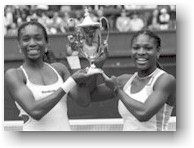Sister
Power
Williams' wins at Wimbledon shatter stereotypes
|
 WASHINGTON�Amid the euphoria of Black sports fans
over the historic doubles victory won by Venus and Serena Williams July 10
and stunning straight-sets tennis victory of Venus over defending
Wimbledon Women�s Champion Lindsay Davenport July 8, reminders of the
awesome burdens borne by Black athletes for decades in the so-called
"country club" sports surfaced again. WASHINGTON�Amid the euphoria of Black sports fans
over the historic doubles victory won by Venus and Serena Williams July 10
and stunning straight-sets tennis victory of Venus over defending
Wimbledon Women�s Champion Lindsay Davenport July 8, reminders of the
awesome burdens borne by Black athletes for decades in the so-called
"country club" sports surfaced again.
For Venus and for her equally talented younger sister�whom
she beat in the All-England Lawn Tennis semi-finals�every step on the
road to victory was draped in history, and laced in irony.
"It�s really great because I�ve been working
so hard all my life to be here," Venus Williams, a product of public
courts in inner-city Compton, Calif., told reporters after her victory.
"And before, I�d go to bed and dream I�ve won a Grand Slam
(tournament) and when I wake up it�s a nightmare. So now I�ve done it.
I don�t have to wake up like that anymore!"
When the Williams sisters met in the semi-finals, they
were the first sisters to play against one another so late in a major, or
"grand slam" tournament in more than a century. They are the
first sisters to win a doubles title in the tournament. Their semi-finals
match was also played on the 42nd anniversary of the second Wimbledon
victory of Althea Gibson, the only other Black woman to win the
prestigious British singles title.
The individual victory by Venus Williams, following
sister Serena�s victory at the 1999 U.S. Open at Forrest Hills, N.Y.,
also makes them the first siblings to win grand slam titles.
Like Ms. Gibson�s win four decades earlier, the
Williams victory at Wimbledon was the subject of media scrutiny. Ms.
Gibson�who won the prestigious title in 1957, at age 30, and again in
1958�endured heckling from the crowd as well as from the press.
Spectators cheered her errors, while newspapers labeled her serious
concentration during the two-week-long competition as sullen, and her
limited remarks to the press were called irritable and impolite.
"Those stereotypes make me sick to the
stomach," Butch McAdams, a coach at Maret School in Washington, and
Radio One News-Talk Network program host told The Final Call,
regarding the television analysis of the Williams matches. "I couldn�t
stand to hear the commentators use the term, �athleticism,� �athleticism,�
�athle-ticism.� And when you heard those terms you knew exactly who
they were speaking about: Venus.
"When you heard the terms �intelligence,� and
�savvy,� " the commentators were talking about her white
opponents, Coach McAdams complained. "Being a former athlete, and
presently a coach, I know that if you reach the top level in sport, it�s
more than �athleticism�."
"When African Americans excel in a sport, like we
saw Tiger (Woods) do at the U.S. Open, they tend to dominate the
sport," Harrison Chastang, a columnist for blacksportstalk.com, told The
Final Call. "These two women are tremendous role models to young
African Americans to take up tennis."
These victories will begin to change the perception of
these sports as being both inaccessible, and "too white" for
young Blacks to pursue. "If given the opportunity, we can excel in
any endeavor, and any discipline," Coach McAdams said.
"There�s no such thing as a �white sport� or
a �Black sport.� It�s a sport. We can excel in every aspect, not
just the labor aspect, but the business side, and the instructional side
as well," he said.
Parental involvement is an important factor, according
to Mr. Chastang, particularly in the success of the Williams sisters.
Young people, he said, have to be exposed to sports and encouraged to
participate in sports which don�t get the media hype that football,
baseball and basketball receive.
"Soccer, tennis, swimming, parents play a
tremendous role in introducing their children to the sports, making sure
that children have a facility to practice. The parents really have to be
just as dedicated as the children," Mr. Chastang pointed out.
�Askia Muhammad |

![]()